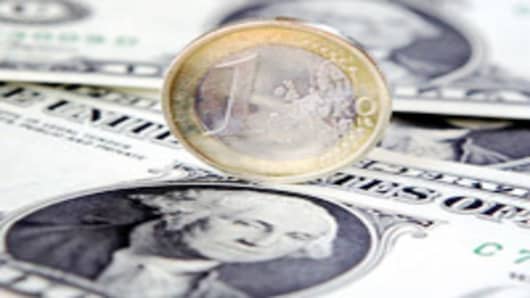The dollar fell broadly Thursday, nearing a three-week low against the euro, after the Federal Reserve held interest rates at 2 percent, dashing expectations of an imminent rate hike.
While the Fed said inflation risks had increased, it did not use language that convinced markets a rate hike was likely at its next policy meeting in August.
The European Central Bank, however, has repeatedly said it may lift rates in July to fight inflation, helping to push the euro near a three-week high at $1.5750 before it eased to $1.5736, up 0.4 percent from late Wednesday.
"The dollar is on the ropes and has further to fall unless the Fed can correct the market perception that U.S. rates are on hold indefinitely," said Michael Woolfolk, senior currency strategist at The Bank of New York Mellon.
With the ECB "clearly focused on inflation and willing to sacrifice growth to keep it at bay," he said the euro is likely to break its all-time record above $1.60 near term.
Fresh concern about the U.S. banking sector and a sharp slide in U.S. stocks also weighed on the greenback, sending it down against the yen .
Fitch Ratings' downgrade of General Motors and Chrysler LLC's credit ratings also hit the dollar, as did the Dow's drop to its lowest level since October 2006.
"The market was already bearish dollars following the FOMC rate decision," said Kathy Lien, chief strategist at Forex.com in New York. "Today's breakdown in U.S. stocks and mixed economic data has sent it even lower."
Elsewhere, sterling rose versus the dollar, near an eight-week high of $1.9896 earlier in the session.
The euro also climbed to a record high at 169.45 yen before easing.
The Japanese currency has been hurt by expectations that the Bank of Japan will keep interest rates at a low 0.5 percent for a while due to weakness in the domestic economy.
Wishing Away Inflation
The U.S. central bank's move to leave interest rates unchanged Wednesday effectively ended one of its most aggressive rate-cutting campaigns, launched last September to curb economic fallout from the housing and credit crisis.
Rising inflation expectations now have many investors worried that the Fed is falling behind the curve.
Oil prices on Thursday shot up more than $3 to above $138 a barrel.
"Wishing away inflation is not a prudent policy move if you are a central banker, and we fear the Fed is going to run afoul of its dual mandate, which includes price stability," Woolfolk said.
Expectations for a July ECB rate hike remained intact after data from German states pointed to an increase in inflation in the euro zone's biggest economy.
"The market is dealing in hard facts and the ECB is very likely to be raising rates next week and probably still sounding pretty hawkish even after they've hiked," said Chris Turner, head of FX strategy at ING in London.
Woolfolk said a report showing the U.S. economy grew at an annualized rate of 1 percent in the first quarter, nearly double the annualized growth rate of 0.6 percent in the final three months of 2007, was more encouraging.
"That's about the best that could have been wished for, and it shows that net exports clearly contributed, but there are obviously still strong downdrafts in the banking and housing sectors," he said.


